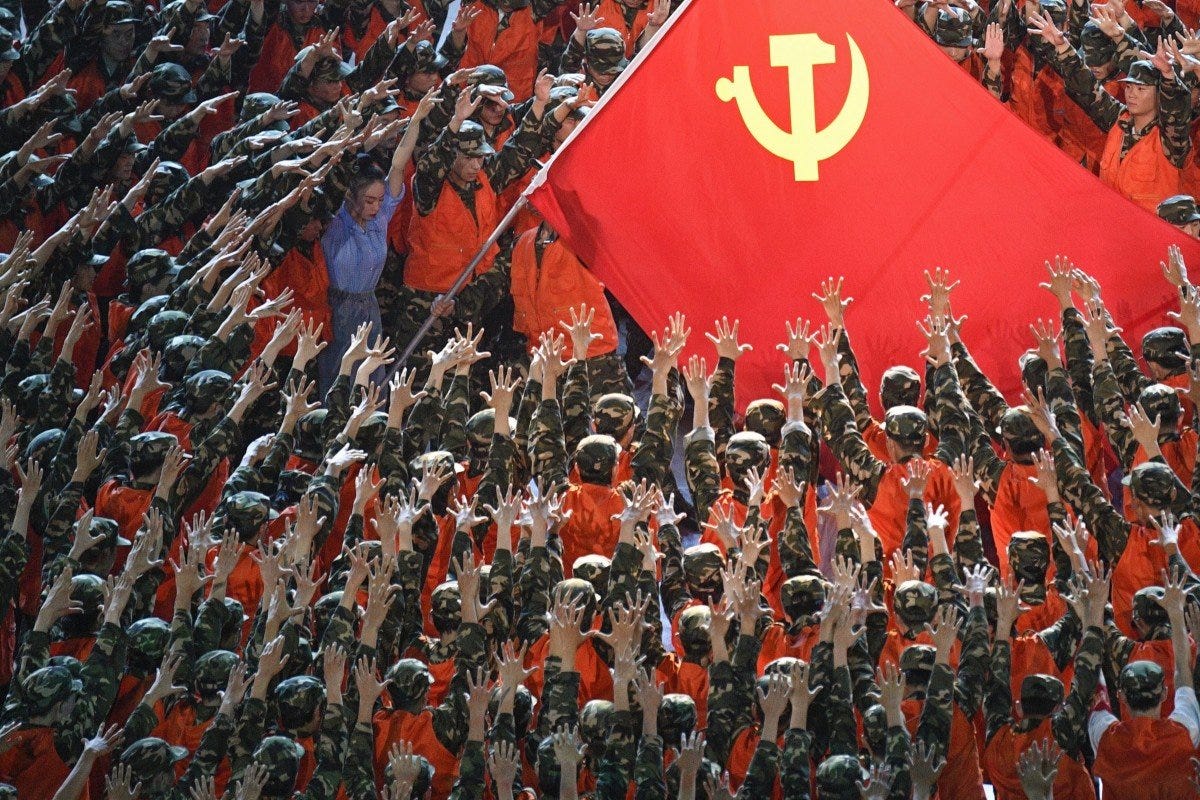Hello fellow China Watchers
I know we are meant to be in the middle of discussing China’s relationship with South East Asia, but it would be remiss of me to not write about one of the most important dates in the Chinese government’s diary this decade - more of which below.
I’ll be back next week with some analysis on what China wants with Singapore, Indonesia, et al; in the meantime, many thanks for reading, and do please consider commenting, sharing, and subscribing.
***
Today I want to discuss an organisation that has grown in importance over the last couple of decades, to the extent that it is now one of the most powerful institutions in the world.
Until recently, this institution wasn’t really known or understood outside of its own borders. But today, its influence extends over everything from the availability of a mobile phone to the success of the energy revolution to the future of blockchain, and it is ignored by the West at its peril.
I am of course talking about the Chinese Communist Party.
A few days ago, on the 1st of July, the CCP marked a hundred years since its foundation in Shanghai. As with autocrats the world over, the CCP never ignores the chance to celebrate its own achievements and so shore up public support, and this was no exception. The Party launched a nation- and world-wide media blitz to accompany a series of high-profile events across the country, including fly-pasts, speeches, and an extravagant art performance in the Birds Nest stadium made famous by the 2008 Olympics.

The fact is, these celebrations would have been welcomed by most people in China, where the Party is broadly, if not highly popular. This might seem strange, or even horrific, for Western commentators, especially those who campaign against the CCP’s policies in Hong Kong or Xinjiang or the South China Sea, to name but a few of the contentious issues that China is currently embroiled in.
However it is fair to say that the CCP has helped to lead China to a completely different place to where it was even forty years ago, let alone when it came to power. The reduction in national poverty (the quickest, most populous decline in history), the construction of world-class infrastructure across much of the country, and the self-belief that now bestrides China – all of this is mainly thanks to the CCP.
If the CCP kept its activities within China’s borders then, like other countries with non-democratic leadership that are useful to the West (such as Saudi Arabia or the UAE) it’s unlikely much would be said about it. But the CCP has strong ambitions to change the world we currently live in, as President Xi Jinping has repeatedly stated. Indeed, the fact that the military jet fly-past in Beijing was in the form of Western-style Arabic numbers (“100”) rather than the Chinese character for a hundred (百), shows that much of last week’s celebration was aimed at a foreign audience.
The question that many ask is, why? What interest does the CCP have in redesigning the world as it exists now?
It is absolutely clear that the primary goal of the Chinese Communist Party is to stay in power. Years ago, over tea in a dusty courtyard in southern China, a Communist party member described to me what happened in the 1958 Iraqi Revolution: how King Faisal was machine-gunned in the palace along with his family, how many of their supporters were slaughtered in the streets, how it led to years of chaos, then Saddam Hussein, then American invasion. Then he turned to me and said, “If the Party loses control, then this is what will happen to us”. Even a cursory look at the bloodshed that accompanies a change in dynasty in Chinese history shows that this is potentially no exaggeration.
With this constant fight for survival in mind, it is little wonder that the CCP is fervent in its demand for control inside China. It also makes it more understandable when you see the CCP trying to change the world into something more in its own image. Not only is there associated prestige by Sinocising the planet – which augments the Party’s standing at home – but it also makes the world a less threatening place for it.
As I have written about before, technology is a main effort in achieving this. One example is the attempt by Beijing to have the United Nations redefine the global internet as a mirror image of the Great Firewall of China, rather than reflect the individualistic, free-flowing American-inspired internet that covers the majority of the world today. A second is the new Blockchain Service Network, is an initiative launched by Beijing to become the leading (and therefore controlling) player in the worldwide blockchain.
Although it is an exaggeration to say that the CCP controls every facet of life in China, Xi Jinping has upgraded the power of the Party in recent years through a mix of legislation and coercion. Thus, it is almost now inconceivable that Chinese reach abroad in whatever guise could not at some point be appropriated for use by the CCP if it wanted. Whether this is Chinese-owned farms in Russia, New Zealand, or Zambia, or Chinese-owned factories in the UK, France, or Ethiopia, or Chinese-owned ports in Australia, Sri Lanka, or Greece, if the CCP saw fit to say jump then there is every likelihood these assets would say how high.
Not only that, but because China is the world’s largest potential market, and because it has control of almost half of global manufacturing, the CCP has the ability to commit economic damage on countries that refuse to bow to its demands – as Australia is currently finding out.
This is the irony of the international situation the CCP finds itself now in. For decades China has been smoothing its passage to the near-top of the international order by emphasising its “peaceful rise”, telling the world that it is here to be a good neighbour and one that countries can trust.
Instead, nations have found that China is quick to push the bully-button if it feels that it has been slighted in any way. So, rather than being warmly welcomed, many people – especially in the West – now take a very dim view of the CCP. As someone told me at the height of the Huawei security debate in the UK, when Chinese diplomats routinely threatened the country if it failed to open itself up to the Shenzhen-based firm, “the more I see of the Chinese Communist Party, the less I like it”.

The CCP was founded with the help of the nascent Soviet Union, a country that many within China despise for its eventual destruction. Thousands, perhaps millions of academic hours are spent examining the reasons for the USSR’s downfall, in the hope that China will avoid the trips and traps that led to the former superpower’s Cold War defeat and its subsequent unravelling.
In many ways, Beijing is certainly learning these lessons. China, and the CCP, are now far more powerful economically than the USSR or Moscow’s Politburo ever were, and the fact that the Party still exists thirty years after its counterpart lost power is also testament to its efforts.
But in other ways, the CCP is lagging far behind. Throughout the Cold War, Moscow was able to call upon legions of people within the West to do its dirty work for it, not because they were necessarily bribed or coerced (although sometimes they were), but because they felt attracted to the system that Moscow offered. Given the CCP’s profile in the UK or US today, it is hard to see a rerun of the Cambridge Five spy ring amongst similar types of ideologue today: it’s notable that almost all the hundreds of spies caught by the West, almost all of them are ethnically Chinese.
Spy-craft aside, many of us who have watched China for a long time feel that there are plenty of lessons for the West to learn from the country’s strategic arrival. The pity is that the CCP has now become so unpopular that it is going to be hard for this to publicly happen.
If the CCP wants to celebrate its centenary in 2121 as a global power, then it needs to learn how to play to the global gallery, not just the one at home.



China feels that all it needs to care about is playing to the local gallery, because they're the world's largest country by population and it gives them a sense that they can somehow self-sustain their economic growth through their domestic market alone. And I mean, it's hard to argue with that kind of hubris brought about by having 1.4 billion people live within your borders.
Now add to that hubris entire generations of Mainland Chinese, be it leaders or the general population, brought up in the Deng years and after, all the way through the boom times of Hu, who knew nothing about how China opened up, and what China was like when it was previously out in the cold internationally before Nixon's visit in 1972 and Deng's opening up of the Chinese economy and manufacturing capacity to the world. They've been brought up only to know of how much the world wanted them. Wanted their money, wanted their customs, wanted their production factories. Post-Cold War globalisation was practically fuelled by China being the world's factory. Hell, the whole concept of globalisation would never have happened if not for China's labour and factory output in producing pretty much every single tat and necessity the world needed and wanted.
Combine "I'm big enough on my own" with "all of you in the world needed and wanted us for so long, look who's the valued one here", and you get a sort of societal and political "big-headedness". It's ego and pride before a fall multiplied by 1.4 billion times under a microscope. and the rest of the world is relatively helpless to give them a dose of reality along the lines of "we giveth, and we can taketh", because not many countries in the world now can afford to wean themselves off demand for Chinese-produced goods, even if they could afford and survive weaning themselves off China as their main export market fuelling their own economic growths. This is even more painfully so for much of the developed West, which is now reaping the dark side of globalisation and transformations into service and knowledge economies without commensurate preservation of their production economic segments.
Because you can't clothe yourself with knowledge or services alone. Neither can you use them to clean your house, watch the news in your living room, gift something physical to your kids at Christmas. You get the gist.
I won't hold out hope for China under the CCP to "learn to play to the global gallery". Not till their pride and ego gets thoroughly cut down to size enough for them to decide to be an equal partner in global cooperation and integration.